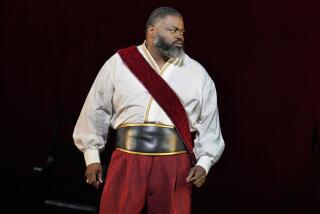A singer who has come into his own
- Share via
He’s not Elvis anymore.
Dmitri Hvorostovsky has lost the pompadour and, more important, the 41-year-old baritone from Siberia has aged gracefully. In fact, at a Dorothy Chandler Pavilion recital Sunday night, Hvorostovsky showed that he’s done more than that. He has grown into a consummate singer.
In 1990, when he made his American recital debut in New York, Hvorostovsky seemed poised for a great career. But on that heavily hyped night, the baritone, a recent sensation in a vocal competition in Cardiff, Wales, offered little more than cheerless songs by Tchaikovsky and Rachmaninoff that were probably unfamiliar to even the many vocal buffs in the hall. The songs were beautifully delivered but unrelentingly depressing.
Hvorostovsky’s smoldering eyes won over the women in the audience, and that started the playful Elvis comparisons. A bit of Verdi at the end indicated a great voice, though it also suggested that the baritone had as yet little connection with the outgoing nature of Italian opera. But the main impression was that of a singer who appeared to identify so completely with dispiriting music that one feared him to be like some introspective suicidal poet straight out of Pushkin.
Sunday night, Hvorostovsky was still at it. He began his recital, put on by Los Angeles Opera, with Tchaikovsky’s “Death” and devoted the first half of his program to more sad songs by Tchaikovsky and Rachmaninoff. Once again, he shared with his listeners a heavy heart, lovelorn sleepless nights, spiritual longing, a wished-for end to it all. With the last song, “Spring Waters,” the dark clouds finally began to lift. Even here, however, the cries of “Spring is coming!” had an edge of desperation to them; the song is by Rachmaninoff, after all.
This does not mean that much has not changed in 14 years. Hvorostovsky has proved to be anything but self-destructive or impetuous. A class act, he has pursued one of the admirable careers in opera by allowing himself time to mature.
Not only were the somber Russian songs given a new sense of urgency Sunday, but the four Verdi arias that ended the recital revealed what is hardly a secret in the opera world anymore. Hvorostovsky has grown into this music to the point where he has become the Verdi baritone of our time, and just possibly the finest singer of Verdi we have.
The Verdi excerpts were from “Stiffelio,” “The Masked Ball,” “Don Carlo” and “Otello.” In each, Hvorostovsky found an ideal balance between elegance of phrase, sumptuous sound, dramatic ferocity and careful attention to small musical details. That is to say, he was true to the music, true to the character, true to his voice and true to himself.
The voice itself is a remarkable instrument. Hvorsotovsky’s sound is not massive, and it was fascinating to observe him gradually adjust to the Chandler’s difficult acoustics. The hall is too big for a recital, and in the introspective Russian songs, he wasn’t always certain of just how hard he should push. There was at first a kind of nervous, uncertain ping to his upper registers. But as the evening wore on, as both he and the music warmed up, his voice bloomed. The bottom deepened and the top opened up.
Hvorostovsky still has room to mature further, dramatically and vocally. In Iago’s “Credo” from “Otello,” he was not able to darken his voice into a genuine threat, although an exceptionally elegant Iago can have a scary meanness all its own. His voice also remains too light for the bass-baritone nature of much Russian opera. He offered three examples -- from Rubinstein’s “The Demon,” Rachmaninoff’s “Aleko” and Borodin’s “Prince Igor” -- but had difficulty going beyond stock grandeur in all but Prince Igor’s aria.
There is also Hvorostovsky’s wondrous breath control, which is both a strength and weakness. Whenever he can get away with it, he will end a song or aria with a robust swell that comes just when you think he should have no more air left in his lungs. It makes for a thrillingly dramatic effect in opera. But in a recital, if used too often, it can seem a party trick. Still, one thrill too many in a vocal recital is hardly something an audience will complain about.
Ivari Ilja was the accompanist. He is a gracious and hardworking pianist who played like a true chamber musician.
More to Read
The biggest entertainment stories
Get our big stories about Hollywood, film, television, music, arts, culture and more right in your inbox as soon as they publish.
You may occasionally receive promotional content from the Los Angeles Times.











